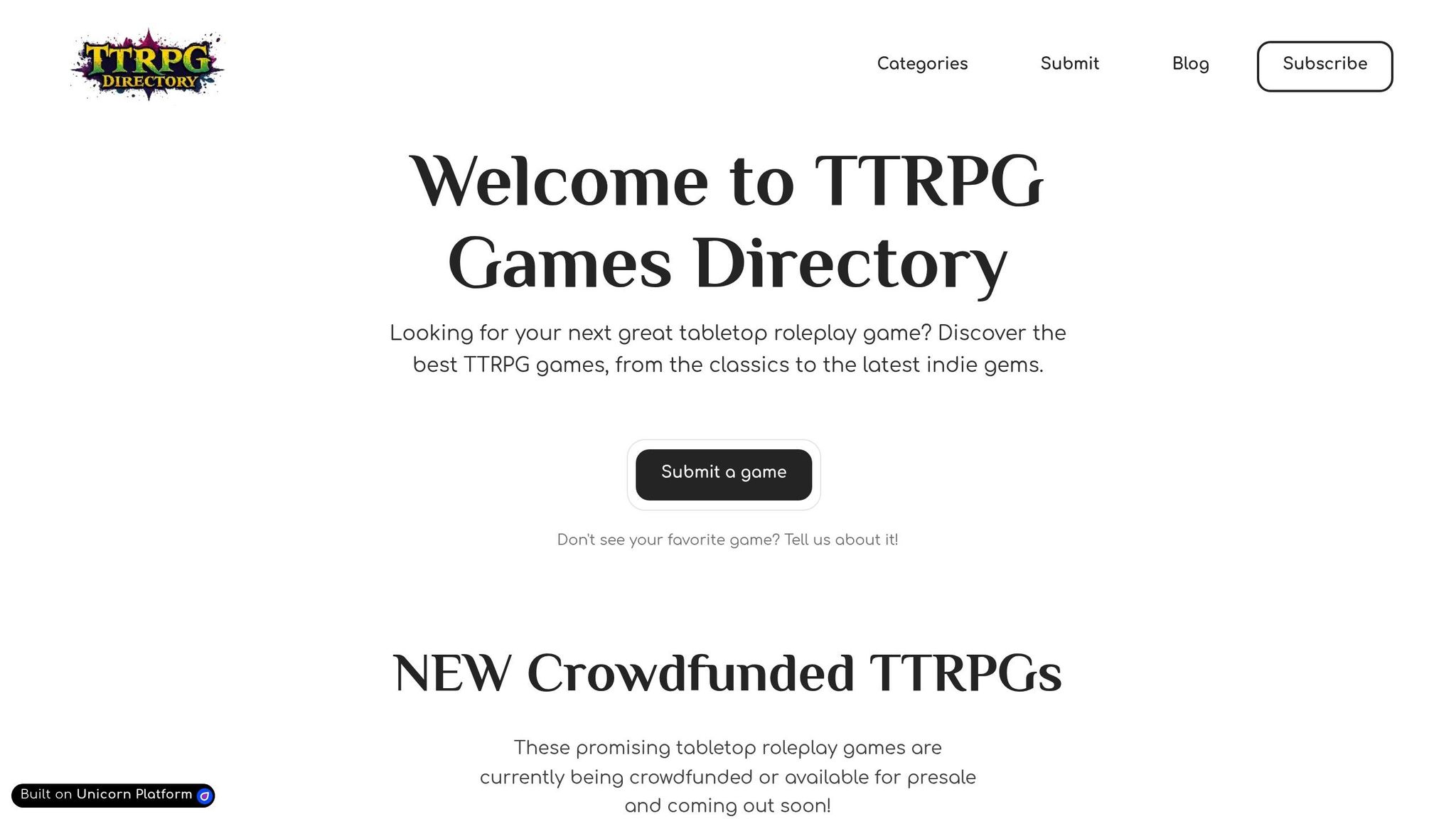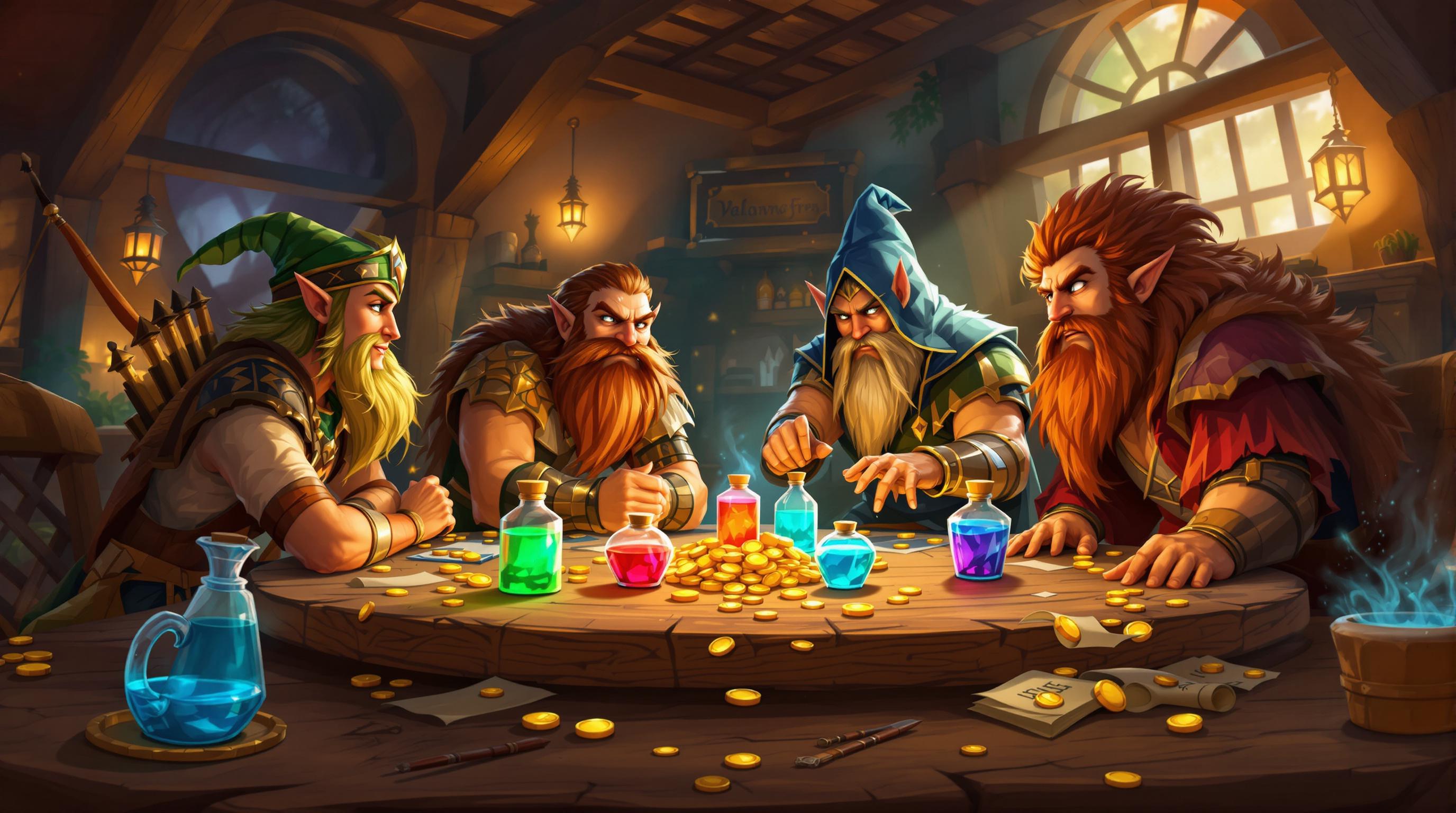NPC dialogue is a cornerstone of immersive RPG gameplay. It shapes the story, builds connections, and reacts to player decisions. Here's a quick guide to crafting memorable NPC interactions:
- Plan Your NPCs: Define their goals, key information, and simple personalities.
- Make NPCs Sound Unique: Match speech to background, add quirks, and keep language clear.
- Focus on Player Interaction: Offer choices, introduce story hooks, and let players influence outcomes.
- Handle Unscripted Conversations: Stick to basics, match reactions to player actions, and keep minor NPCs brief.
- Use Tools and Records: Leverage NPC generators, track details, and explore TTRPG directories for inspiration.
These strategies ensure NPCs feel consistent, relatable, and integral to the story. Dive into the article for detailed tips to elevate your RPG sessions.
Creating EPIC NPC Dialogue with a Pro DM (5 Techniques)
1. Plan Your NPCs
Creating engaging NPC dialogue starts with solid preparation. By planning key aspects of your NPCs, you can craft conversations that feel natural and align with your story while responding to player choices.
a. Define NPC Goals
Give each NPC a clear purpose that shapes their dialogue. Think about what they want from interactions with players and how this fits into their role in the story.
For instance, a merchant NPC might have these goals:
- Main Objective: Sell rare magical items to players.
- Secondary Objective: Gather intel about local dangers.
- Personal Goal: Search for their missing sibling.
These layered motivations add depth to their conversations while keeping interactions purposeful and engaging.
b. Outline Key Information
Prepare the crucial details each NPC needs to share during gameplay. This might include:
- Important plot clues or revelations.
- Local knowledge tied to ongoing quests.
- Personal backstories that intrigue players.
- Links to other NPCs or locations.
Organize this information in easy-to-reference bullet points. Focus on the facts that drive the story and encourage interaction.
c. Create Simple Personalities
Develop straightforward but distinctive traits for each NPC. This keeps them interesting without making them overly complex to manage.
Key personality elements to consider:
- Dominant Trait: Their standout characteristic.
- Motivation: What drives their behavior.
- Quirk: A unique detail that makes them memorable.
- Relationship Style: How they interact with others.
Once these basics are in place, you can concentrate on giving each NPC a unique voice that sets them apart.
2. Make Each NPC Sound Different
Giving each NPC a distinct voice helps players quickly identify characters and stay engaged. Once you've outlined your NPCs, focus on shaping their dialogue to reflect their background and personality.
a. Match Voice to Background
Align each NPC's speech with their background. Consider these factors:
- Education Level: A scholar might use technical or academic language, while a farmer could rely on straightforward, practical words.
- Profession: A merchant might frequently mention trade terms, while a sailor could sprinkle in nautical phrases.
- Social Status: Nobles often speak more formally, whereas commoners tend to use simpler, more direct language.
- Regional Identity: Subtle accents or regional expressions can hint at an NPC's origins.
b. Add Simple Speech Habits
Give key NPCs one or two distinct speech habits to make them stand out:
- Verbal Tics: Repeated phrases or words they often use.
- Speech Rhythm: Some NPCs may talk quickly and energetically, while others speak slowly and thoughtfully.
- Word Choice: Specific terms or phrases that reflect their personality.
For example, a seasoned guard captain might frequently mention "regulations" or "protocol", while a storyteller could often start with, "Let me tell you a tale."
c. Keep Language Simple
Ensure NPC dialogue is easy to follow:
- Use Clear Vocabulary: Stick to familiar, straightforward words.
- Break Up Information: Share details in small, manageable pieces.
- Stay Consistent: Maintain steady speech patterns, but don't overdo it.
- Highlight Key Traits: Focus on one or two defining characteristics.
Distinctive speech doesn't have to mean complicated speech. A merchant and a priest can sound completely different through their word choices and attitudes without resorting to overly elaborate language.
When writing dialogue, prioritize clarity and personality. Players should instantly understand what an NPC is saying while recognizing their unique voice.
sbb-itb-b8b00a5
3. Focus on Player Interaction
After establishing unique NPC voices, the next step is to center dialogue around player choices. Let’s look at how offering dialogue options, weaving in story hints, and allowing player influence can make NPC interactions more engaging.
a. Offer Conversation Choices
Design NPC interactions that let players make meaningful decisions:
- Extend naturally from the conversation: Choices should feel like a logical part of the dialogue.
- Impact NPC reactions: Dialogue options should visibly change how NPCs respond.
- Provide context: Give enough details so players can make informed decisions.
For example, when players meet a merchant, they might:
- Use their character’s skills to haggle for better prices.
- Ask about local rumors that could lead to side quests.
- Build rapport, potentially unlocking future opportunities.
b. Introduce Story Hooks
NPCs are perfect for hinting at new adventures and expanding the story. When creating dialogue:
- Blend current quest details with subtle hints about larger storylines.
- Add mystery to encourage players to dig deeper.
- Align hooks with the player's character background or interests.
For instance, an innkeeper mentioning strange lights in the hills feels more natural than outright directing players to investigate a specific location.
c. Let Players Influence Outcomes
Conversations should give players control and allow their choices to shape the story:
- Let players steer the direction of the dialogue.
- Track their interactions to influence future encounters.
This approach makes dialogue feel dynamic and personal. Here’s how NPCs might respond to different player actions:
| Player Action | NPC Response |
|---|---|
| Helps NPC | Becomes friendlier, offers discounts or extra information. |
| Threatens NPC | Acts guarded, may spread negative rumors about the player. |
| Shows Interest | Shares more details and remembers player preferences. |
| Ignores NPC | Becomes less helpful, may withhold useful information. |
4. Handle Unexpected Conversations
Players often push NPC dialogue into areas you didn’t plan for. Managing these moments well keeps the story flowing and the interactions interesting.
a. Stick to the Basics
When players take the conversation off-script:
- Start by defining the NPC’s mood and immediate goal
- Keep the focus on their current objective
- Use consistent details to maintain believability
For example, if a player asks a town guard about local politics, decide if the guard is jaded or loyal. This emotional backdrop helps guide natural responses.
b. Match NPC Reactions to Player Actions
NPC reactions should reflect how players approach the interaction:
| Player Approach | NPC Reaction | Example |
|---|---|---|
| Direct Questions | Straightforward | Provides brief, factual answers |
| Friendly Chat | Open and personal | Shares opinions or tells a short story |
| Suspicious Behavior | Guarded and wary | Responds cautiously or becomes defensive |
| Skilled Persuasion | Cooperative but wary | Reveals extra, but limited, information |
Keep NPC behavior consistent while responding to player choices. For instance, if a talkative merchant suddenly clams up, it should feel intentional, hinting at something deeper. For less important NPCs, keep responses short and to the point.
c. Be Brief with Minor NPCs
Minor NPCs only need short, functional dialogue:
- Stick to 2-3 sentences
- Focus on their immediate purpose
- Add one colorful detail for flavor
A street vendor might say, “Fresh fruits and veggies! Best prices in town!” This gives players what they need without dragging the game down.
If players dig deeper, redirect them. A shopkeeper could say, “You’ll need to talk to the guild master about that,” keeping the story consistent and avoiding unnecessary complications.
5. Use Available Resources
Enhance your NPCs by leveraging tools and strategies that make character creation and management easier. These resources help you balance careful planning with on-the-spot improvisation, keeping your NPCs consistent and engaging.
a. Use NPC Creation Tools
Digital tools can simplify NPC creation and inspire fresh ideas. Here are a few types to consider:
| Tool Type | Purpose | Best For |
|---|---|---|
| Name Generators | Quickly naming characters | Minor or background NPCs |
| Personality Builders | Crafting distinct character traits | Key recurring characters |
| Voice Pattern Guides | Developing unique speech styles | Memorable quest-givers |
These tools are great starting points, but remember to add your own creative touch to make your NPCs stand out.
b. Keep Detailed NPC Records
Consistency is key when managing NPCs across multiple sessions. A simple tracking system can help you stay organized. Include details like:
- Core traits: Personality, goals, and relationships with others.
- Speech patterns: Unique phrases, accents, or quirks.
- Player interactions: Notable conversations, promises, or conflicts.
- Story impact: How the NPC influences the narrative.
Whether you prefer digital note-taking apps or a physical gaming journal, keeping these records updated ensures your NPCs remain consistent and believable.
c. Explore the TTRPG Games Directory

The TTRPG Games Directory is a treasure trove of ideas for NPC interactions. By exploring different game systems, you can uncover:
- Games with creative dialogue systems.
- New approaches to character relationships.
- Unique methods for handling social encounters.
Look for games that align with your campaign’s tone - be it political drama, lighthearted humor, or intense character-driven stories. The directory’s detailed descriptions can help you find mechanics that suit your specific needs.
Conclusion: Creating Better NPCs
Crafting engaging NPC dialogue takes preparation and a thoughtful approach. By using these strategies, you can transform NPCs into memorable characters that enrich your game's story while seamlessly blending into player interactions.
Focus on building distinct personalities, keeping character voices consistent, and allowing room for meaningful player exchanges. These elements combine to create NPCs that not only support your narrative but also react naturally to player choices.
For more ideas and tools to enhance your NPCs, check out resources like the TTRPG Games Directory. It features games with creative dialogue mechanics and character development systems that can inspire your own designs.
To put these ideas into action:
- Start with one or two key NPCs and build your cast gradually.
- Keep track of NPC interactions to ensure consistency.
- Try out different voice styles and personalities.
- Regularly review your NPCs to make sure they stay relevant to the story.
Each session is a chance to improve. By focusing on NPCs that drive the story and create meaningful moments, your game world will feel more alive than ever.


